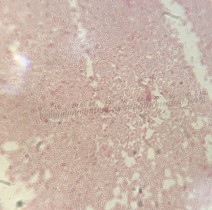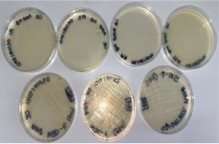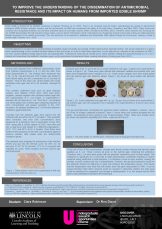By Ciara Robinson //
 Antimicrobial resistance threatens public health; therefore, there is a need to better understand AMR dissemination through animals, humans, and the environment. Antibiotic is unregulated in some regions of the world, leading to them being discarded into bodies of water, where wildlife can become the hosts of AMR bacteria. Escherichia coli (E. coli) bacteria are widely abundant in the environment, exposing them to antibiotics. They are known to have AMR genes.
Antimicrobial resistance threatens public health; therefore, there is a need to better understand AMR dissemination through animals, humans, and the environment. Antibiotic is unregulated in some regions of the world, leading to them being discarded into bodies of water, where wildlife can become the hosts of AMR bacteria. Escherichia coli (E. coli) bacteria are widely abundant in the environment, exposing them to antibiotics. They are known to have AMR genes.
The study aimed to gain an understanding of possible routes AMR could be spread from imported shrimp. Improve the knowledge of how resistant bacteria behave in the food chain. Investigate whether cooking the imported shrimp as instructed by the government if the antibiotic-resistant gene is broken down. 
The findings of this project are that the E. coli found in the three supermarkets all contained ampicillin-resistant genes. This resistance could lead to antibiotics not being an effective treatment method in the future. No changes in plasmid size occurred between the three different temperature conditions. Therefore, the high temperatures most likely had not broken down the AMR gene. Further research would be necessary to see how AMR is spread by performing a transformation.
There were several challenges in conducting my research in the laboratory. It took almost five weeks for me to find E. coli from three out of the four supermarkets shrimp. This is due to the agars being overrun with different bacteria. Seven types of agar were tested, including 6 of them being specialized to grow E. coli. Additionally, my first plasmid extraction was unsuccessful as they produced <10 % DNA concentrations. Finally, my first gel electrophoresis did not work very well, and I am unsure as to this reason. 
This opportunity to gain first-hand experience in conducting research has been an invaluable experience, especially due to the support of my supervisor Dr Ron Dixon who is exceptionally knowledgeable in microbiology. He shared his in-depth knowledge of the subject, which helped me push through the challenges I otherwise may not have. This scheme has given me a deeper understanding of how I can conduct and present my final year project research, and it has enabled me to improve my academic writing and research skills. My passion for research has increased throughout this experience and this project has helped me to realise which Masters course I would like to apply for in the future.
*To view Ciara’s research poster and presentation recording, please click on the thumbnails below:

